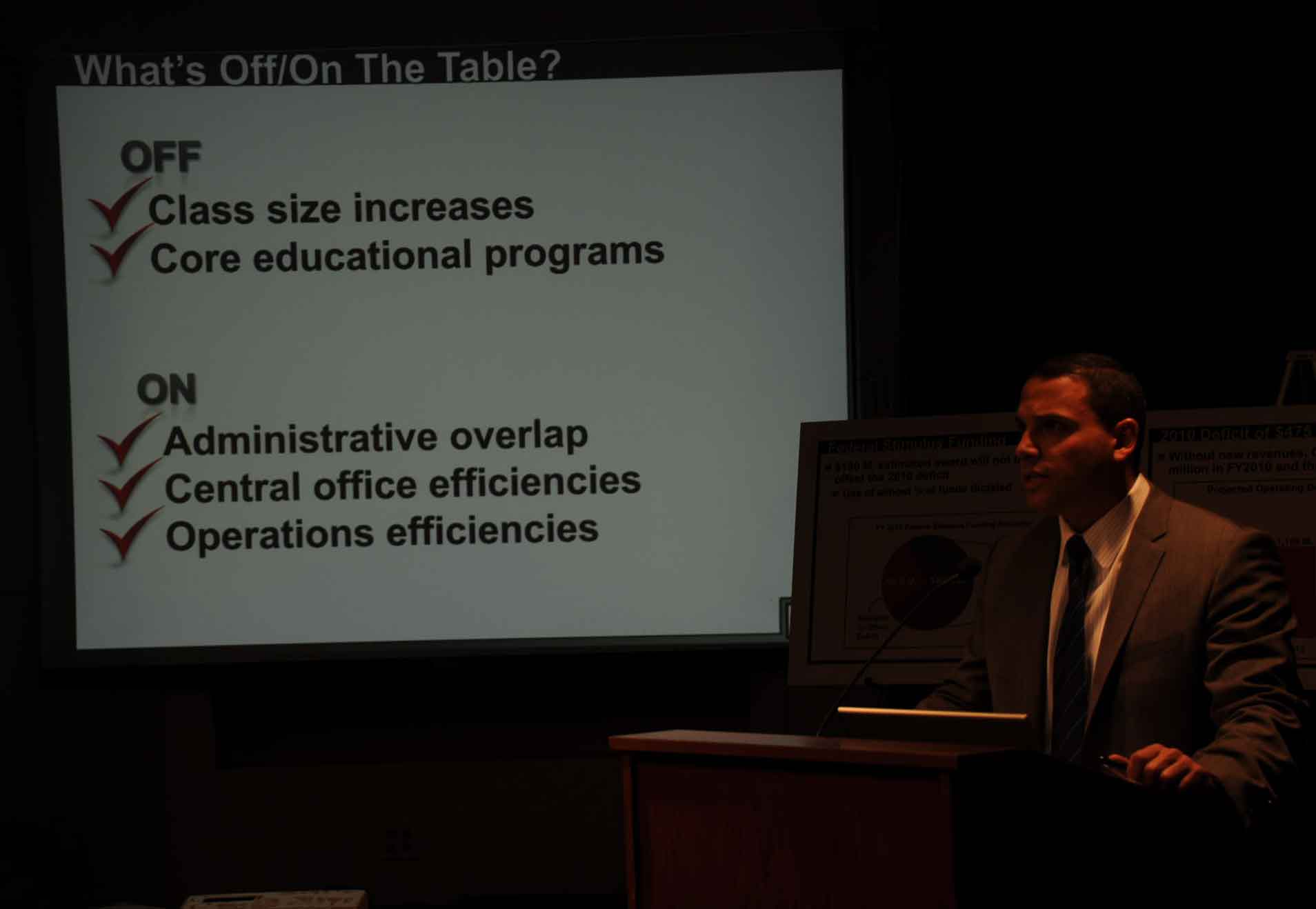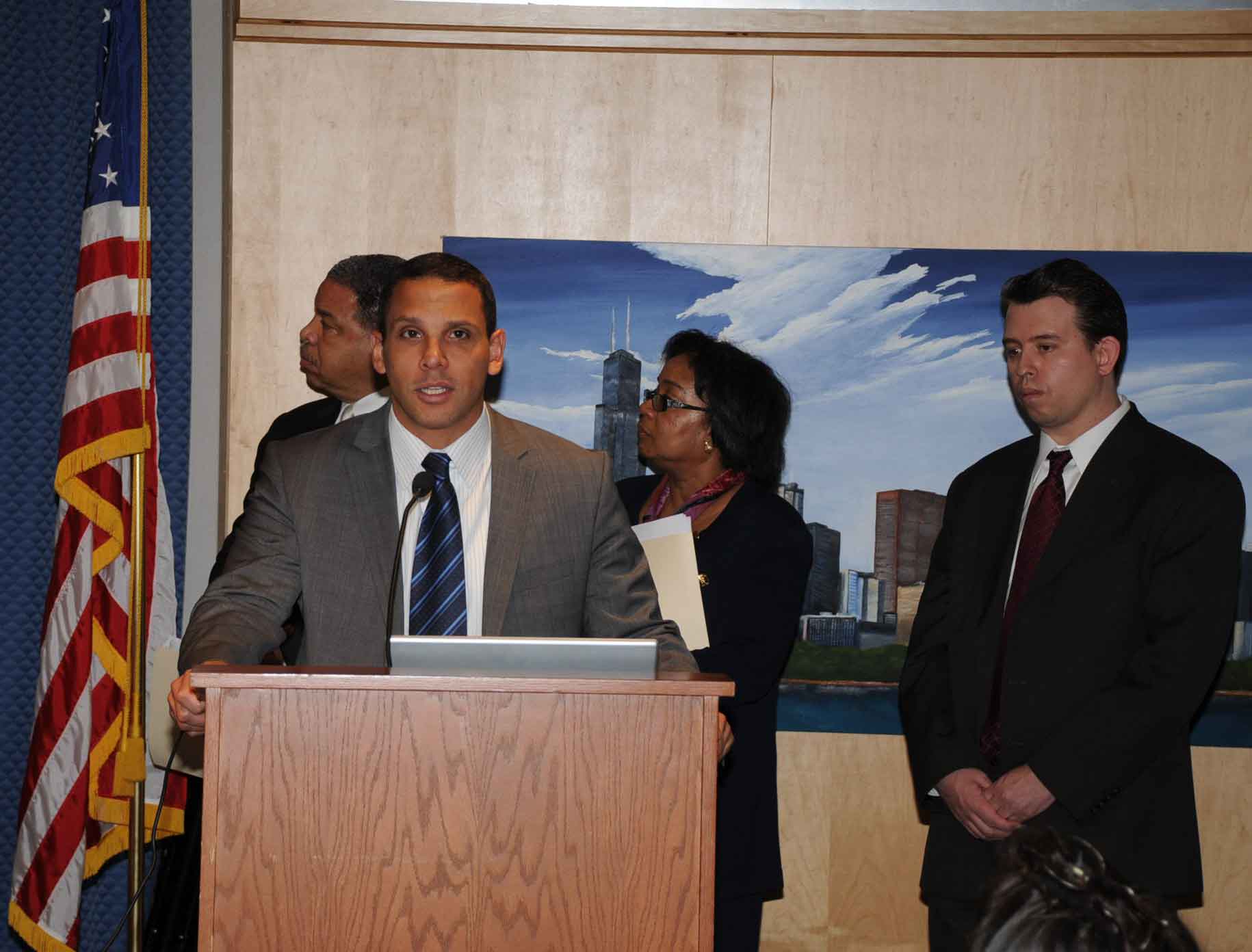Analysis: CPS 'Deficit'... How much is real and how much is more 'Magic Numbers'?
The top officials of the Chicago Board of Education held their annual press conference announcing that the school system faced a massive 'deficit' on the afternoon of March 11, 2009, and the majority of the members of the Chicago press corps performed according to their annual Chicken Little and Teacher Bashing scripts, but the actual numbers underlying the headlines were less daunting than either CPS officials or the city's major corporate media would likely portray.
 Newly appointed Chicago Public Schools Chief Executive Officer Ron Huberman (above at podium) made it clear that his budget priorities would concentrate on cutbacks in what he considered central office "inefficiencies" and would not touch schools or union contracts. Despite attempts by reporters from the Chicago Sun-Times and Crains Chicago Business to force Huberman to say that he would cut teachers, the CEO refused to do so, saying that such cuts would ultimately depend on student membership in the 400,000-student school system, and not on arbitrary pressures. One of the things that some observers noted was that the corporate media seemed to believe that CPS student membership would continue to decline, while in the schools the situation in the economy was resulting in increases in students who are leaving private and parochial schools as they families face harder economic times. Substance photo by George N. Schmidt. Surrounded by Power Point charts, Chicago's new public schools Chief Executive Officer Ron Huberman did the main presentation about the state of the school system's finances. With Huberman were Board of Education President Michael Scott, the school system's "Chief Education Officer" Barbara Eason-Watkins, and the school system's Chief Financial Officer Pedro Martinez.
Newly appointed Chicago Public Schools Chief Executive Officer Ron Huberman (above at podium) made it clear that his budget priorities would concentrate on cutbacks in what he considered central office "inefficiencies" and would not touch schools or union contracts. Despite attempts by reporters from the Chicago Sun-Times and Crains Chicago Business to force Huberman to say that he would cut teachers, the CEO refused to do so, saying that such cuts would ultimately depend on student membership in the 400,000-student school system, and not on arbitrary pressures. One of the things that some observers noted was that the corporate media seemed to believe that CPS student membership would continue to decline, while in the schools the situation in the economy was resulting in increases in students who are leaving private and parochial schools as they families face harder economic times. Substance photo by George N. Schmidt. Surrounded by Power Point charts, Chicago's new public schools Chief Executive Officer Ron Huberman did the main presentation about the state of the school system's finances. With Huberman were Board of Education President Michael Scott, the school system's "Chief Education Officer" Barbara Eason-Watkins, and the school system's Chief Financial Officer Pedro Martinez.
Only Eason-Watkins did not speak during the presentation and question-and-answer session, which lasted more than a half hour in the school board's press conference room at 125 S. Clark St.
Since both Huberman and Scott have been in office less than two months, they asked the press to give them a break as they were learning the system's complex financial and educational systems. Huberman was appointed in January 2009 to succeed former Chicago schools CEO Arne Duncan, who had been appointed by President Barack Obama to be U.S. Secretary of Education. Scott was appointed to be President of the Board of Education in February 2009 after former Board President Rufus Williams was dumped by Chicago Mayor Richard M. Daley. Officially, Williams offered his resignation, which Daley accepted. Huberman and Scott were both appointed by Daley, who controls the school system under mayoral powers that have been in effect since 1995, when the Illinois General Assembly passed the so-called "Amendatory Act". The Act gave the mayor dictatorial control over the Chicago public schools.
Setting the agenda against pension fund, special education
 Three other officials of the Chicago Public Schools joined Chief Executive Officer Ron Huberman at the March 11, 2009, press conference on the CPS budget. Behind Huberman are, left to right, Board of Education President Michael Scott, Chief Education Officer Barbara Eason-Watkins, and Chief Financial Officer Pedro Martinez. Substance photo by George N. Schmidt.Scott and Huberman quickly set the agenda with their discussion of the Power Point materials which were distributed to the press and also available on charts scattered behind the speakers.
Three other officials of the Chicago Public Schools joined Chief Executive Officer Ron Huberman at the March 11, 2009, press conference on the CPS budget. Behind Huberman are, left to right, Board of Education President Michael Scott, Chief Education Officer Barbara Eason-Watkins, and Chief Financial Officer Pedro Martinez. Substance photo by George N. Schmidt.Scott and Huberman quickly set the agenda with their discussion of the Power Point materials which were distributed to the press and also available on charts scattered behind the speakers.
According to Scott and Huberman, the school system is facing an unprecedented $475 million "shortfall" in its next operating budget. Both speakers were careful not to refer to the amount as a "deficit", although the prepared text of the Board's press release called it a "deficit."
The "shortfall" according to the two, was caused by the increasing expenses faced by the Board. These include increased staff salaries, increased costs of medical and other health insurance, and, most notably, increased pension costs.
The attack on the increased costs for the Chicago teachers pension fund were deliberately left vague in both the presentation materials and in the narrative provided by Huberman and Scott. In fact, most people in the room did not even know that the Chicago teachers are in a pension fund that is separate from the rest of the state, nor that the Chicago fund is much more healthy from a financial point of view than the state.
From one point of view, the official narrative was very similar to the narrative attempted by the Bush administration following the 2004 election, when President George W. Bush said that he was going to privatize Social Security. Costs, taken out of context, are cited, then extrapolated, without any mention of the complex history that gave rise to them.
In the case of Chicago Teachers Pension Fund and the Board of Education's obligation to pay money into the fund, Scott and Huberman were careful to ignore the fact that the Board's obligation only existed when the CTPF dropped below 90 percent "funded". Nor did Scott mention the fact that during his years as President of the Chicago Board of Education, at least two years saw the Board receive a windfall (i.e., no payments into CTPF) because the pension fund's investments performed so well that CTPF was above 90 percent (and at one point above 100 percent).
Also highlighted as an additional cost was Special Education. According to the Power Point materials, 13 percent of CPS students are special education, but Illinois is not fully funding the special education programs of CPS.
No questions or follow-up
On Thursday (March 12) and Friday (March 13), I waited to hear from CPS about a time to follow up with additional questions about the budget claims made during the March 11 press conference. That request was ignored by CPS communications staff. Prior to the March 11 media event, I had told Monique Bond, who is now in charge of Huberman's public relations, that I would have several questions after reading the budget materials they presented, so there would have to be some way to ask additional questions. Press conferences and media events such as the one staged at CPS on March 11 do not leave the time or the space to ask serious budget questions.
As of Saturday, March 14, there had been no follow up.
To be continued:
Substance has requested interviews with Scott, Huberman and Martinez on the complex realities underlying the presentations of March 11. These interviews will be published in Substance (print edition) and on the Web at www.substancenews.net when they are completed and verified by both sides. The only condition Substance is setting is that the interviews not contain deliberate factual inaccuracies.

